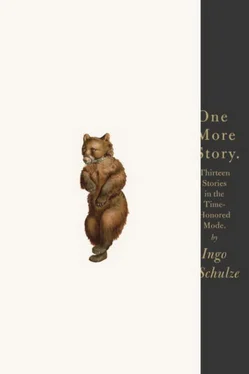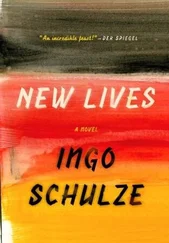A week without her was endless, I barely lasted two. I didn’t understand her change of heart. When she wrote me — neither of us had a telephone, and only emergency calls were allowed at both the theater and my lab — that she would be in rehearsal the next weekend as well and still had a script to learn, I took a train to A.
Julia had an evening rehearsal. I waited in the café across from the theater, missed her when she left, so that when I finally rang her doorbell she was already asleep — she was subletting a two-and-a-half-room apartment with no private bath. This was five days before her twenty-sixth birthday. I asked her where we should celebrate, in A. or B.? Julia said she wasn’t up to celebrating this close to her premiere. Of course I grabbed a train for A. anyway.
The doorkeeper let me in solely out of the goodness of her heart. When I entered the canteen, there I stood — a bag of presents in one hand, a bouquet in the other — facing about two dozen people discussing whether they would be traveling to Leipzig for a demonstration the next Monday, October 2.
It was after midnight when we finally left. I hurriedly arranged a little birthday table. Julia, already in her pajamas, said, “You look like you’re about to burst into tears.”
I was in fact pretty desperate. But I hoped the spell Julia was under would be broken in that moment by one of our magic charms — and knew that I wasn’t going to be able to go on like this.
On Wednesday, October 4, I participated in the meeting at the church in B., said something to the effect that in our country allegiance to the party meant more than doing good work — a ridiculous platitude, but it was met with lots of applause. Afterward two men asked me if I didn’t want to work with the New Forum in B. I should add that I was risking a great deal. My paper, “New Research on the Superductility of Aluminum — Zinc Alloys,” had earned me some provisional laurels, preparations for the first series of experiments were proceeding without a hitch, and Professor Walther from Martin Luther University in Halle had held out the prospect of a position.
The premiere of Sophocles’ Antigone was what is called a thundering success. I bore up under the endless premiere party without a peep, and was on my best behavior the whole time. It was not until the next morning when I told Julia about my statement at the church that she opened up.
To be admired by her was wonderful, but then she said that what I’d done would definitely please Ms. What’s-her-face — I’ve forgotten the name of her director. I said I had no desire to please Ms. What’s-her-face, to which Julia replied that I’d hardly have much of a chance in any case, since What’s-her-face was a lesbian.
If you think that with that the definitive word was spoken, you’re mistaken. I say this of course with no ultimate certainty, but precisely because the relationship between What’s-her-face and Julia was so ambiguous, it left me in a quandary.
Things were proceeding in B. just as elsewhere in the country, except that the demonstrations in B. were never mentioned on the radio — which left us with a sense of disappointment and futility.
Before the New Forum in B. got a copy machine — smuggled in from our sister city K. in West Germany — we had to type up our initial proclamation over and over using four sheets of carbon paper. Ute, who worked in the lab at the polyclinic, and I were the only ones who could touch-type. The two of us would often sit typing until midnight in the “hobby cellar” of a dilapidated villa. This was almost perfect busywork for me — I wasn’t alone and I didn’t have to think about anything.
It was probably our work ethic that convinced the New Forum’s “speakers council” that the copy machine would be in good hands with Ute and me. But beginning in early November when we had nothing more to fear and suddenly everybody had something they wanted to copy — we asked for twenty pfennigs a copy as a donation — we set up regular office hours, with Ute and me covering fifty-fifty.
Ute was in love with me from the start. On our trip to Coburg — we intended to spend our “welcome money” for copy machine cartridges — I told her about Julia and the fantastic summer we had had. But that made no difference whatever in her behavior.
When it becomes clear that you may touch the woman beside you whenever you want, yes, that she’s waiting for you to touch her, you finally do it when the opportunity arises. I was surprised by how passionate and simple and beautiful sex with her was. We had sex almost every day, and afterward everything was always just as before. At some point I asked myself if it was possible for me to love Ute. Thought it just for a moment, one brief instant, and it seemed absurd of course — I couldn’t leave Julia for Ute.
I made the trip to A. for Julia’s Shakespeare premiere on November 26. The theater was practically empty. All the same I congratulated Ms. What’s-her-face, who was quick to ask why my hands were so cold. “Are my hands really that cold?” I asked in amazement and held one hand up to my cheek, which sent What’s-her-face into peals of laughter. Julia’s expression took on a telling look.
In the middle of December what had to happen happened. Julia visited me in B. for the first time — someone had offered her a ride and she had grabbed the chance. The someone was What’s-her-face. Later Julia said she sensed right off that something was wrong with me. She hadn’t shown her face for three and a half months, and then there she was at my door with What’s-her-face. Was I supposed to burst with happiness? I made coffee, put some cake on the table, and wished What’s-her-face would go to hell.
What’s-her-face enthused about the demonstrations in Leipzig and how they had turned everything upside down—“not just for us in the theater, but in the whole town of A.” I asked who “us” was. “Well, all of us!” she cried, spreading her arms wide. “The whole theater!” Julia talked about solidarity among colleagues, about the incredible experience of being certain that they could depend on one another. “If they had dragged one of us from the stage, we all would have gone to jail.”
What was I supposed to tell them about? Our copy service?
While What’s-her-face talked, the thought of being left alone with Julia made me nervous. Julia was sitting on the sofa still wrapped in her coat, her hands in her pockets — I had opened the window because we were all smoking up a storm — and was presumably feeling much the same. The good-byes when What’s-her-face left were extremely cordial. She apologized for having robbed us of an hour and a half of our time together, and even gave me a hug too at the end.
Actually everything could have turned out all right, but when Julia remarked how happy she was that What’s-her-face and I were finally connected, that working with What’s-her-face meant a great deal to her, and that maybe I could understand now why she, Julia, hadn’t been able to visit me — I saw red.
Was this how things were going to be with us from now on? I asked. And while Julia stared at me in utter dismay, I shouted, “I can’t live like this!” I surprised myself with how angry and embittered I sounded. I wanted a decision. I wanted my Julia back. Either paradise or — all right — nothing. It all seems totally insane to me now, but at the time I thought I had suffered enough. Julia then made the remark that she had sensed something of the sort when she came through the door.
“I’ve been cheating on you,” I replied, and tried to explain myself to her. Her pulling back like this had driven me crazy, but she was my whole life, without her I would simply freeze to death, I wanted nothing more than to be with her, just like it was before. But she said nothing, as if hesitating to summon the effort.
Читать дальше












